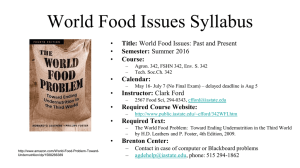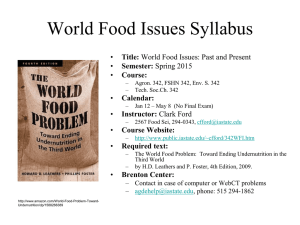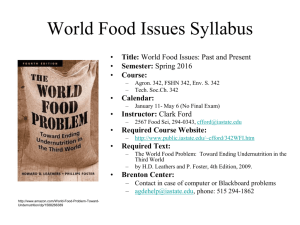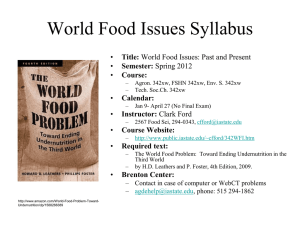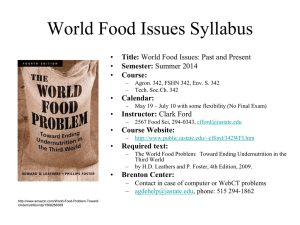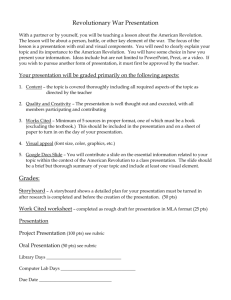Introduction to Course Syllabus
advertisement
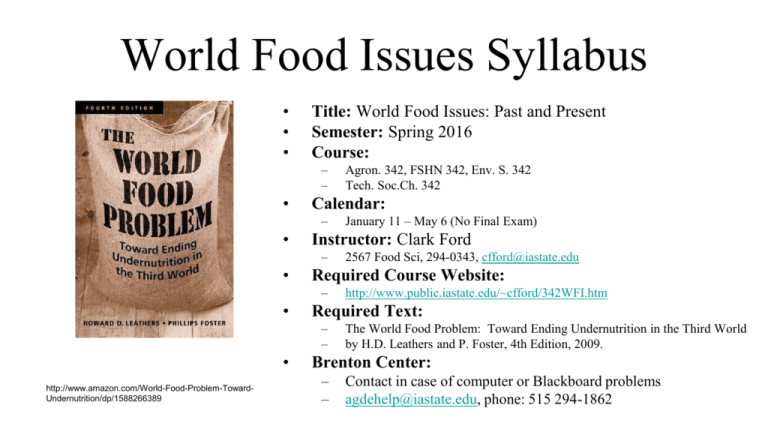
World Food Issues Syllabus • • • Title: World Food Issues: Past and Present Semester: Spring 2016 Course: – – • Calendar: – • http://www.amazon.com/World-Food-Problem-TowardUndernutrition/dp/1588266389 http://www.public.iastate.edu/~cfford/342WFI.htm Required Text: – – • 2567 Food Sci, 294-0343, cfford@iastate.edu Required Course Website: – • January 11 – May 6 (No Final Exam) Instructor: Clark Ford – • Agron. 342, FSHN 342, Env. S. 342 Tech. Soc.Ch. 342 The World Food Problem: Toward Ending Undernutrition in the Third World by H.D. Leathers and P. Foster, 4th Edition, 2009. Brenton Center: – – Contact in case of computer or Blackboard problems agdehelp@iastate.edu, phone: 515 294-1862 Course Webpage World Food Issues: Past and Present FSHN 342, AG 342, Univ Stud 342, TSC 342 EnvS 342 Spring 2016 Instructor: Clark Ford Course Website Google: World Food Issues http://www.bcps.org/offices/lis/models/9famstudworldhunger/images/WH_grnkorea.jpg Course Description • We will examine world food issues from the perspectives of: – The way things are in the present – How things got this way – Policies and solutions for the future http://www.smh.com.au/ffximage/2005/06/30/poverty_wideweb__430x387.jpg Course Description 1: The way things are in the present • World Hunger in developing nations • Interrelated global, economic, political and social issues: – – – – – Poverty and inequity food production, biotechnology, ecological destruction, population growth, • Ethical issues concerning these topics will be discussed. World Hunger Map www.feedingminds.org/ img/map_world.jpg Course Description 2: How things got this way • • • • • Slave Trade • • • • http://www.socialistworker.co.uk/chimage.php?image=2007/2043/triangle_map.jpg The agricultural revolution Hierarchical agricultural societies Food production and geography Invention and technology Winners and losers in 10,000 years of – Conquest and population growth – Interaction of religion, government, and economic systems Unequal treatment of women The industrial revolution Colonialism and imperialism Global economic domination – by wealthy over developing nations Course Description 3: Policies and Solutions for the future http://www.dailygalaxy.com/photos/uncategorized/2007/ 07/17/norman_borlaug.jpg • Policies: – Health – Economics – Demographics – Aid – Consumer Subsidies – Farming subsidies – Land Distribution – Agricultural research – Development • Aid Organizations • What can we do? Grading 90-80-70% • Quizzes, 20 pts each – • Nutrition Case Study – • Movie Report http://i30.photobucket.com/albums/c310/chugs1124/ Gallery%201/blood_diamond_ver3.jpg 20 pts Aid Organization Report – • 20 pts Historical Origins of Hunger Case Study – • 20 pts Movie Report – • 20 pts Green Revolution Report – • 20 pts Student Presentation – • 20 pts News Report – • 140 pts 20 pts Extra Credit – – Paper (20 pts) Lecture reflections (2 @ 5 pts) Exam Format Sample Question: – Is it morally acceptable that 25% of the world’s population controls 75% of its resources? Use ethical theories and principles to defend your argument. • Quizzes: – 10 short answer questions – 2 points each – You have 40 minutes • Quizzes based primarily, but not solely, on study guide questions • Must use ethical theories and principles when asked for! Testing – Off Campus (if you live far away from Ames) • Off-campus students – You MUST find a Proctor for all quizzes • do this the first week! – Print off Proctor form • Send completed form to me: Clark Ford 2312 Food Sciences Bldg Iowa State University Ames IA 50011 Fax: 515 294-8181 email: cfford@iastate.edu On-Campus Testing 60 Carver & 2552 Gilman Fall & Spring Semester Doors Open Doors Locked* Last Submission of Exams** Computers Shutdown*** Monday – Thursday 8:00 am 7:30 pm 8:00 pm 8:00 pm Friday 8:00 am 5:30 pm 6:00 pm 6:00 pm Days LAS Testing Center is closed weekends, University Holidays and Breaks. *After the doors are locked for the evening students will not be permitted to enter to take exams. **Students must have finished their exam and submitted it by the times noted. ***Once the computers shut down they will not be restarted to allow students to finish exams. Students should allow enough time to complete exams prior to computer shut down. Written Reports • There are 6 written reports – – – – – – • 2-3 pages of text, typed – – • • From peer reviewed journals Must be cited in text Reference must give authors, date, Journal, volume, pages Engaged discussion – http://www.concurringopinions.com/archives/hunger.jpg plus Bibliography Single or 1.5 spaced At least 3 scholarly references – – – • Nutrition Case Study News Report Green Revolution Report Movie Report Historical Origins of Hunger Report Aid Organization Report of ethical, environmental, social, economic, historical (etc.) implications. Must develop ethical arguments – Use ethical theories and principles Powerpoint Project – Individual presentations • Powerpoint slides – With ethics – With references • Audio recording (if possible) – Must include a transcript! http://www.internationalwaterinstitute.org/education_center.htm Extra Credit • Paper – 20 points – Relevant subject – 5 page report – At least six scholarly references • – – Must relate to hunger/malnutrition Must include a discussion • – Norman Borlaug http://johnkemeny.com/blog/wp-content/uploads/2006/10/borlaug.jpg of nutritional, environmental, social, political, historical implications, etc. Must include ethics discussion • • from peer reviewed journal articles using ethical theory and developing ethical arguments Lectures – 2 @ 5 pts each – Assigned online lectures – Write 1 page summary/reflection Section 1 • Topics: – World Hunger – Famines – Malnutrition • Reading: Malnutrition: Kwashiorkor http://www.imageenvision.com/md2/sym_0004-0703-14222622_nurse_standing_with_a_group_of_african_children_showing_symptoms_of_the_protein -deficiency_disease_kwashiorkor.jpg – – – – WFP Ch 1-3; Food Insecurity in the World 2005 World Hunger 12 Myths News Stories • Videos • Quiz 1 Section 2 • Topics: – Hunger Ethics – Economics – Population • Reading: – WFP Ch 4-12 – World Hunger a Moral Response – News Stories World Population Growth • Videos • Nutrition Case Study • Quiz 2 Section 3 • Topics: – Environment – Agriculture – Biotechnology • Reading: – WFP 13-14 – Advances in Plant Biotechnology in Developing Countries – News Stories • Videos • News Report • Quiz 3 http://www.povertymap.net/mapsgraphics/index.cfm?data_id=23360&theme= Section 4 • Topics: – Agricultural Revolution – Agricultural Societies – Ancient History • Reading: – The worst mistake in the history of the human race – News Stories Agriculture in Ancient Egypt http://images.easyart.com/i/prints/rw/en_easyart/lg/3/0/Scene-of-butchersand-servants-bringing-offerings-Tomb-of-Onsou-Egyptian-Art-302241.jpg • Videos • Green Revolution Report • Quiz 4 Section 5 • Topics: – – – – – Age of Discovery Industrial Revolution Women in Ag societies Religion in Ag societies Markets and Capitalism • Reading: – News Stories Industrial Revolution • Videos • Movie Report • Quiz 5 Section 6 • Topics: – Global Policies: • • • • Health Incomes Globalization Demographics • Reading: – WFP 15-20 – News Stories Clothing Factory, India http://www.globaleye.org.uk/secondary_summer/oncamera/india-factory.html • Videos • Origins of Poverty Report • Quiz 6 Section 7 • Topics: – Global Policies: • Agriculture • Development – Aid Organizations • Reading – WFP 21-24 – Food Sovereignty – The End of Poverty World Health Organization immunizations http://seattlepi.nwsource.com/africa/photos/immunization-002.jpg • Videos • Aid Organization Report • Quiz 7 How to get an A • Attend class – Online students: watch lectures • • • • • Study lecture notes Do required reading Watch videos Fill out study guides Put effort into your reports and presentation • Work at it every day • Engage in the subject! http://www.scottsdalecc.edu/future_students/strategies_for_success.html – Especially your area of interest How to not get an A • Getting behind – No time to study, write • Not preparing for quizzes – You will do poorly • No ethics arguments/theory – Or only asking “is it ethical for…?” – (I will say “you tell me!”) • Plagiarism – Cutting and pasting • Minimal answers – Or rote memory answers Hung-over student • – Must engage in the subject! • http://www.bbc.co.uk/wear/student/2004/09/images/students_hangover_270.jpg Minimal discussions Minimal bibliographies
